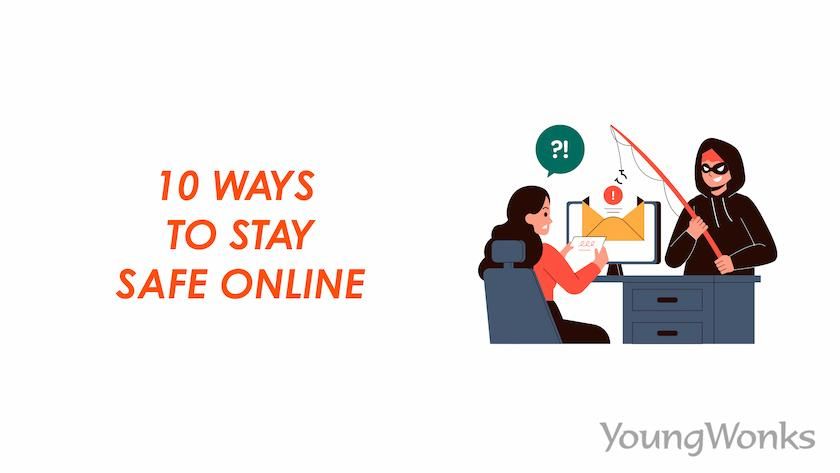Dec 19, 2024 By Team YoungWonks *
10 effective ways to stay safe online
1. Stay Secure with Strong Passwords and a Password Manager
The foundation of cybersecurity begins with creating strong, unique passwords for each of your online accounts. A robust password includes a mix of uppercase and lowercase letters, numbers, and symbols, making it harder for cybercriminals to crack. However, remembering dozens of complex passwords is no easy task. That's where a password manager comes in. A password manager securely stores your login information, making it easier to maintain different passwords across multiple platforms, from your social media to online banking accounts.
2. Multi-Factor Authentication for Extra Protection
Even a strong password might not be enough to prevent unauthorized access. Multi-factor authentication (MFA), also known as two-factor authentication, adds an additional security layer by requiring users to provide another verification step. Many services today, including mobile devices, email, and banking platforms, offer MFA options to ensure that only you can access your information.
3. Guarding Against Phishing Scams
One of the most common online attacks is phishing, where cybercriminals attempt to deceive users into revealing their sensitive information. These scams often come in the form of fake emails, texts, or social media messages from what seem like reputable sources. Recognizing these tactics can save you from falling victim. Avoid clicking on links in suspicious emails and always verify the sender's information before responding. Knowing how to spot phishing attempts, along with using security software to scan for malicious attachments, is key to staying safe.
4. Using a VPN for Security on Public Wi-Fi
Public Wi-Fi networks are notoriously insecure, making it an ideal target for cybercriminals. When you connect to an unsecured network, such as in a public place like a cafe or airport, others on the same network can potentially see your data. By using a Virtual Private Network (VPN), you can create a secure, encrypted connection that protects your data from prying eyes. This is particularly important when accessing sensitive information, such as bank account details or personal emails.
If you're looking for a reliable VPN, here are three top options to get started:
- NordVPN : Known for its strong encryption, fast speeds, and a no-logs policy, NordVPN is a great option for securing your online activities.
- ExpressVPN : Offers high-speed servers worldwide, excellent security features, and an easy-to-use interface for both beginners and advanced users.
- Surfshark : A budget-friendly VPN with unlimited device connections, strong privacy protection, and reliable performance on public Wi-Fi networks.
By choosing a trusted VPN, you can enhance your security and privacy whenever you connect to a Wi-Fi network in a public setting.
5. Regular Software Updates and Security Software
Keeping your operating systems (especially Windows), web browsers, and applications up to date is essential for online safety. Many updates address vulnerabilities that cybercriminals can exploit, so regular updating is key. Additionally, installing anti-virus software on all your devices provides an added layer of protection against malware and ransomware attacks. Don’t forget to turn on the firewall on your router and devices to block unauthorized access and harmful traffic.
6. Smart Use of Privacy Settings on Social Media
Social media platforms are often full of personal data, and privacy settings can significantly impact your online safety. Adjust your settings to limit who can see your posts, location, and other personal details. Be mindful of what you share publicly, as oversharing can provide information to those with malicious intentions. Always be cautious when connecting with strangers, and avoid sharing sensitive information like your credit card details or home address.
7. Safe Browsing and Recognizing Secure Sites
When browsing, check for the padlock icon in the URL bar, indicating a secure connection. This is especially important when making online purchases or logging into sensitive accounts. Stick to reputable websites and avoid sites that seem untrustworthy or lack a security certificate. In addition, ensure your web browsers have the latest internet security updates to stay protected from malicious content.
8. Be Mindful of Who You Meet Online
When you meet online, especially on social networking platforms, it’s important to look out for potential red flags. Avoid sharing personal or sensitive information with people you don’t know well. Cybercriminals often use fake profiles to gather information or trick users into scams, so always be cautious about connecting with strangers.
9. Protecting Your Mobile Devices
Our smartphones and laptops carry a significant amount of personal information, so protecting them is crucial. Set up a lock screen with a strong password, PIN, or biometric verification, and enable features like remote wipe, which allows you to erase your data if your device is lost or stolen. Keep an eye out for unusual activity or apps, which could signal malware or spyware, and only download apps from trusted sources.
10. Avoiding Fake News and Deepfakes on Social Media
Social media is rife with misinformation, and learning to recognize fake news is important for staying informed and safe. Deepfake technology can make it difficult to distinguish real videos and images from fake ones. Always verify information from multiple sources, be cautious of sensational content, and avoid sharing unverified news. Educating yourself and others on how to identify deepfakes can protect you from being misled.
How Can Kids Stay Safe on the Internet?
Children face unique online threats, so they should follow these guidelines:
- Use privacy settings to limit who can see their posts.
- Avoid sharing personal information such as addresses, phone numbers, and school names.
- Stick to age-appropriate websites and apps.
- Never communicate with strangers online without parental supervision.
- Report any suspicious activities or interactions to a trusted adult.
Conclusion
Staying safe online requires vigilance and smart digital habits. Whether you're managing passwords, protecting your hard drive, or being cautious about the people you meet online, taking proactive steps can help keep your data and identity secure. Implementing cybersecurity practices not only protects your personal and financial information but also helps ensure a safer digital world. In some cases, offline measures such as storing critical documents in person can add an extra layer of security. Always be aware of potential threats, regularly update your security measures, and make safe browsing a daily habit.
FAQs
1. How to Spot a Deepfake on Social Media?
Look for inconsistencies in facial expressions, unnatural blinking, or audio-video mismatches. Cross-check information if the video seems too good to be true.
2. What Personal Data Do Companies Track?
Companies often track browsing history, location data, and purchase behavior to personalize ads and improve services.
3. Will I still be able to log on to Online Banking using only my username and password?
Many banks now require MFA or other secure methods for login to enhance cybersecurity and protect user accounts.
4. How do I know that a fraud or phishing attempt is underway?
Common signs include unsolicited emails asking for personal information, unfamiliar links, or urgent language meant to pressure you into acting.
5. What is Cybersecurity?
Cybersecurity refers to the practices and technologies used to protect systems, networks, and data from online attacks and unauthorized access.
*Contributors: Written by Kabir Pandey ; Edited by Disha N ; Lead image by Shivendra Singh

